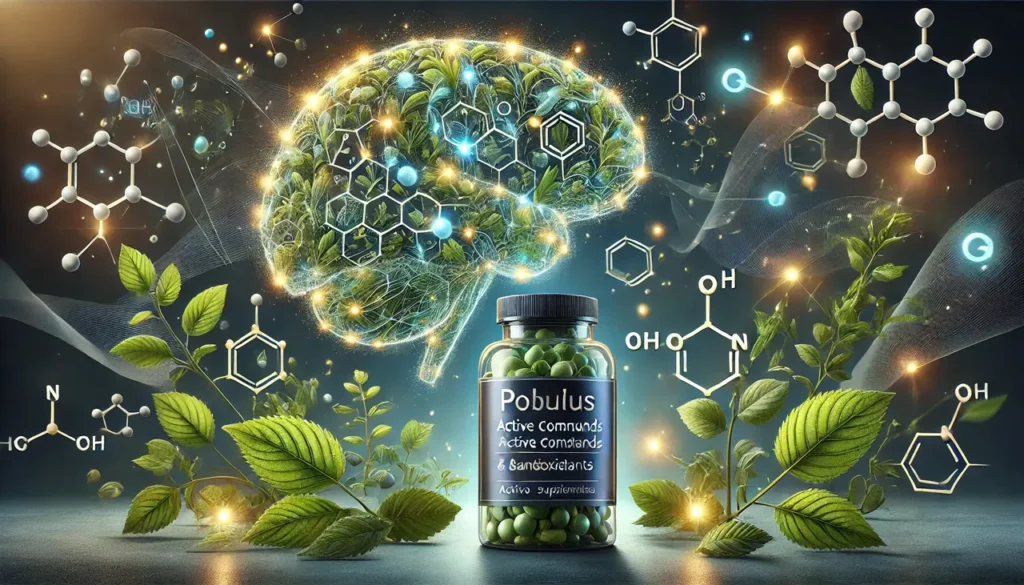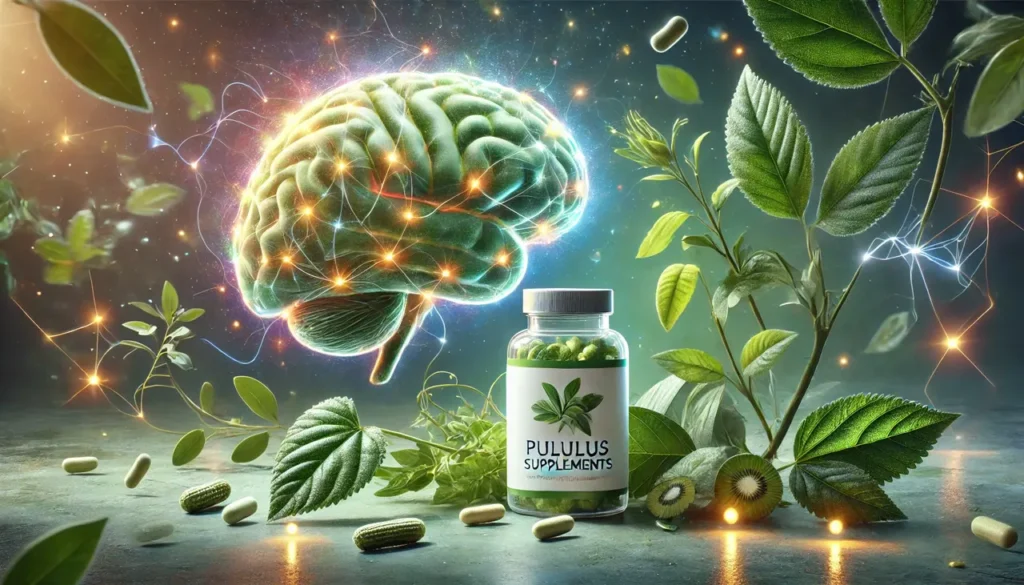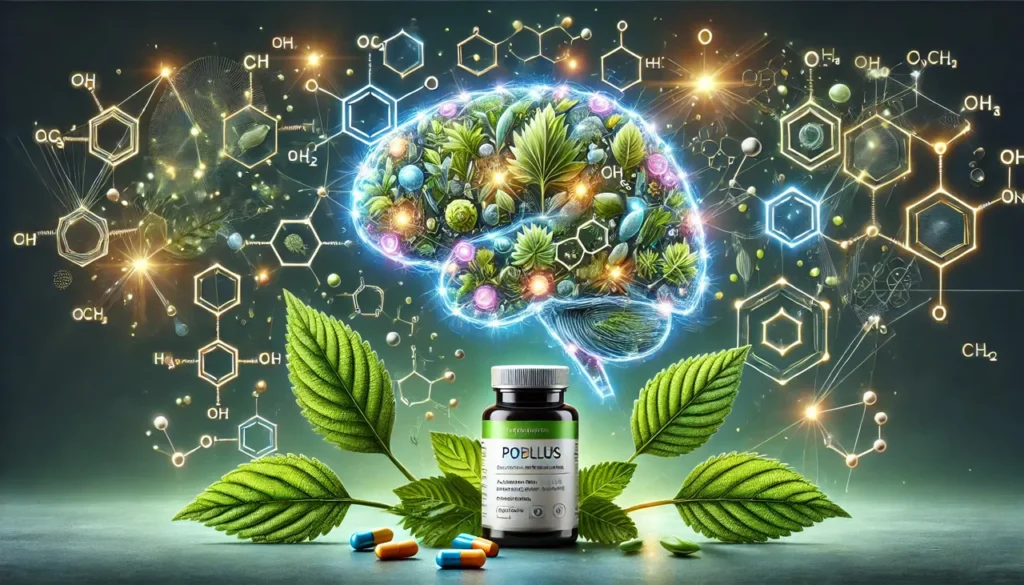Poplar, primarily derived from the species within the Populus genus, has gained attention for its potential health benefits, including cognitive enhancement. Traditionally used in herbal medicine, poplar bark and buds are rich in compounds that exhibit antioxidant, anti-inflammatory, and neuroprotective properties. As interest in nootropics—substances aimed at enhancing cognitive function—grows, poplar has emerged as a candidate for supporting brain health. This article explores poplar in detail, including its sources, chemistry, physiological mechanisms, potential nootropic benefits, dosing guidelines, side effects, drug interactions, and other essential considerations for safe supplementation.
You May Also Like:
Sources of Poplar
Poplar is sourced from several species, including Populus tremuloides (quaking aspen) and Populus deltoides (eastern cottonwood). The bark and buds of these trees are primarily utilized for their medicinal properties.
Common Sources Include:
- Poplar Bud Extracts: Often used in tinctures and herbal remedies, these extracts are rich in flavonoids and polyphenols.
- Poplar Bark: The bark contains salicylates, compounds related to aspirin, which can have anti-inflammatory effects.
Poplar extracts are commonly found in herbal supplement formulations, particularly those targeting inflammation, pain relief, and cognitive health. As these formulations continue to gain popularity, understanding their composition and potential benefits becomes increasingly important.

Chemistry of Poplar
The medicinal properties of poplar largely stem from its bioactive compounds, including flavonoids, polyphenols, and salicylic acid.
- Flavonoids: These compounds have strong antioxidant properties, which help combat oxidative stress in the body and brain. Notable flavonoids found in poplar include quercetin and kaempferol, which have been shown to promote neuronal health and reduce inflammation.
- Polyphenols: Similar to flavonoids, polyphenols contribute to the antioxidant capacity of poplar. They are linked to improved blood flow and reduced risk of neurodegenerative diseases.
- Salicylic Acid: A precursor to salicin, salicylic acid exhibits anti-inflammatory properties, which can support cognitive function by reducing neuroinflammation.
The unique chemical composition of poplar allows it to exert a range of physiological effects, particularly beneficial for brain health.

Physiological Mechanisms of Poplar in the Body and Brain
Poplar exerts its effects through multiple mechanisms, contributing to both overall health and cognitive function.
Key Mechanisms Include:
- Antioxidant Activity: The flavonoids and polyphenols present in poplar help combat oxidative stress by neutralizing free radicals, thereby protecting neurons from damage. This neuroprotective effect is crucial, as oxidative stress is a significant factor in cognitive decline and neurodegenerative diseases such as Alzheimer’s and Parkinson’s.
- Anti-Inflammatory Effects: By reducing neuroinflammation, poplar can help maintain optimal brain function. Chronic inflammation in the brain is associated with various cognitive impairments, including memory loss and mood disorders.
- Enhanced Neurogenesis: Some studies suggest that poplar may promote neurogenesis, the process of generating new neurons. This effect is vital for maintaining cognitive function, especially as individuals age. Neurogenesis is particularly important in the hippocampus, a region of the brain associated with memory and learning.
- Improved Circulation: Poplar extracts may enhance blood flow to the brain, increasing the delivery of oxygen and nutrients necessary for cognitive function. Improved cerebral circulation can lead to better focus, memory retention, and overall cognitive abilities.
By understanding these mechanisms, researchers can better appreciate the potential of poplar as a nootropic supplement.
Soothe Stress and Alleviate Anxiety with Premium Supplements for Mental Calm—Shop Now on Amazon!

Nootropic Benefits of Poplar
The interest in poplar as a nootropic is supported by its potential to enhance cognitive performance and overall brain health.
- Enhanced Cognitive Performance: Poplar’s antioxidant and anti-inflammatory properties may improve cognitive performance by stabilizing neuronal function and protecting against oxidative stress. Enhanced blood flow to the brain, along with reduced inflammation, could lead to improved focus, memory, and overall cognitive abilities, especially in individuals facing cognitive challenges. This improved cerebral circulation ensures that the brain receives adequate oxygen and nutrients, which are essential for optimal performance. Moreover, by mitigating the effects of chronic stress on the brain, poplar can contribute to better mental clarity and resilience in the face of cognitive demands.
- Protection Against Cognitive Decline: The neuroprotective properties of poplar may offer a safeguard against age-related cognitive decline and neurodegenerative diseases such as Alzheimer’s and Parkinson’s. Its ability to reduce oxidative stress and inflammation is crucial in preventing the neuronal damage associated with these conditions. By promoting the health of synapses and enhancing neuronal communication, poplar may help maintain cognitive functions such as memory and learning in older adults. Furthermore, regular intake of poplar may slow the progression of cognitive impairments, potentially allowing individuals to maintain their independence and quality of life for longer periods.
- Mood Enhancement: Emerging evidence suggests that the antioxidant properties of poplar may positively influence mood by modulating neurotransmitter levels and reducing neuroinflammation. A healthy balance of neurotransmitters is vital for emotional regulation and cognitive function. Poplar’s anti-inflammatory effects may also alleviate symptoms of anxiety and depression, creating a more stable emotional state. By fostering a positive mood and reducing stress levels, poplar may enhance overall mental well-being, allowing individuals to engage more fully in daily activities and relationships.
- Support for Brain Health: Poplar is known to promote overall brain health by protecting against oxidative damage and supporting neurogenesis. Regular consumption may contribute to improved cognitive longevity, making it a valuable addition to a brain-healthy diet. In addition to supporting memory and learning, poplar may enhance overall brain resilience, helping individuals adapt to environmental stressors. The synergistic effects of poplar’s bioactive compounds can help create a holistic approach to brain health, emphasizing the importance of incorporating such nutrients into one’s lifestyle for long-term cognitive benefits.
- Improved Memory and Learning: Preliminary studies suggest that poplar supplementation may enhance memory retention and learning capabilities, particularly in older adults. Poplar’s ability to promote neurogenesis and reduce oxidative damage could be key factors in this effect. By fostering the growth of new neurons in the hippocampus, an area critical for memory formation, poplar may play a pivotal role in improving overall cognitive function. Additionally, the enhancement of synaptic plasticity, the brain’s ability to adapt and strengthen connections, could lead to improved learning outcomes, making poplar a potentially valuable supplement for students and lifelong learners alike.

Dosage and Supplementation Guidelines
Determining the appropriate dosage of poplar is essential for maximizing its benefits while minimizing potential risks. Due to the lack of extensive clinical studies, specific dosing recommendations can vary widely.
- General Dosage Guidelines: For general cognitive enhancement, a dosage range of 100-500 mg of poplar extract per day is often suggested, with higher doses potentially offering greater benefits. It is advisable to start at the lower end of this range and gradually increase as needed.
- Formulations: Poplar is available in various forms, including capsules, tinctures, and liquid extracts. The concentration of active ingredients may vary between products, making it essential to follow the manufacturer’s dosage guidelines.
- Consultation with Healthcare Professionals: As with any supplement, individuals should consult with healthcare professionals before starting poplar supplementation, especially if they have pre-existing health conditions or are taking medications that could interact with poplar.

Side Effects and Safety
Poplar is generally considered safe for most individuals when taken at recommended dosages. However, some side effects may occur, particularly at higher doses.
- Gastrointestinal Disturbances: Some users may experience mild gastrointestinal symptoms, such as nausea, diarrhea, or abdominal discomfort, especially when starting supplementation.
- Allergic Reactions: Although rare, allergic reactions to poplar extracts can occur. Individuals with known sensitivities should exercise caution and consult a healthcare provider before use.
- Possible Drug Interactions: Poplar may interact with certain medications, particularly those affecting blood clotting, due to its salicylic acid content. Individuals taking anticoagulants or antiplatelet drugs should consult their healthcare provider before starting poplar supplementation.
Interactions with Other Supplements and Medications
Understanding potential interactions with other supplements and medications is crucial for safe use.
- Anticoagulants: As mentioned, the salicylate content in poplar may enhance the effects of anticoagulants, increasing the risk of bleeding. Individuals on blood-thinning medications should exercise caution and seek medical advice.
- Anti-inflammatory Medications: The anti-inflammatory effects of poplar may synergize with non-steroidal anti-inflammatory drugs (NSAIDs) such as ibuprofen. While this can enhance anti-inflammatory benefits, it may also increase the risk of gastrointestinal side effects.
- Nootropics: Poplar can be combined safely with other nootropic supplements, such as omega-3 fatty acids or Bacopa monnieri, to enhance cognitive function. However, users should monitor their reactions and adjust dosages accordingly.
- Caffeine: Some individuals combine poplar with caffeine to boost cognitive performance. While this may enhance focus and alertness, excessive caffeine intake may lead to anxiety or jitteriness, so moderation is essential.
Risks for Individuals with Certain Health Conditions
While poplar is generally safe, individuals with specific health conditions should exercise caution.
- Bleeding Disorders: Due to its potential anticoagulant effects, individuals with bleeding disorders or those scheduled for surgery should avoid poplar supplements unless supervised by a healthcare provider.
- Pregnancy and Breastfeeding: Limited research exists regarding the safety of poplar supplements during pregnancy and lactation. Pregnant or breastfeeding individuals should consult their healthcare provider before use.
- Liver or Kidney Disease: Individuals with liver or kidney disease may need to avoid high doses of poplar, as these organs are involved in metabolizing and excreting compounds present in the supplement.
Increase Mental Endurance and Reduce Stress Naturally with Rhodiola Rosea—Find Top Picks on Amazon!

Conclusion: Should You Consider Poplar as a Nootropic?
Poplar presents a promising option for those seeking to enhance cognitive function and overall brain health. Its antioxidant and anti-inflammatory properties, coupled with its ability to support neurogenesis and improve circulation, make it a valuable addition to the nootropic landscape. However, more research is needed to fully understand its efficacy and safety as a cognitive enhancer.
As with any supplement, it is crucial to consult with a healthcare professional before beginning poplar supplementation, especially for individuals with pre-existing health conditions or those taking medications that may interact with poplar. By maintaining a cautious approach and considering individual health circumstances, users can explore the potential benefits of poplar while minimizing risks.
In summary, poplar offers a fascinating insight into the world of nootropics. Its unique chemical composition and potential cognitive benefits continue to fuel research and interest in this natural supplement.

References:
- Poplar as a medicine. Retrieved from: https://www.rxlist.com/supplements/poplar.htm
- Poplar Bud (Populus) Extraction and Chinese Propolis Counteract Oxidative Stress in Caenorhabditis elegans via Insulin/IGF-1 Signaling Pathway Retrieved from: https://www.mdpi.com/2076-3921/13/7/860
- Poplar bark lipids enhance mouse immunity by inducing T cell proliferation and differentiation. Retrieved from: https://pmc.ncbi.nlm.nih.gov/articles/PMC7468065/
Important Note: The information contained in this article is for general informational purposes only, and should not be construed as health or medical advice, nor is it intended to diagnose, prevent, treat, or cure any disease or health condition. Before embarking on any diet, fitness regimen, or program of nutritional supplementation, it is advisable to consult your healthcare professional in order to determine its safety and probable efficacy in terms of your individual state of health.
Regarding Nutritional Supplements Or Other Non-Prescription Health Products: If any nutritional supplements or other non-prescription health products are mentioned in the foregoing article, any claims or statements made about them have not been evaluated by the U.S. Food and Drug Administration, and such nutritional supplements or other health products are not intended to diagnose, treat, cure, or prevent any disease.


